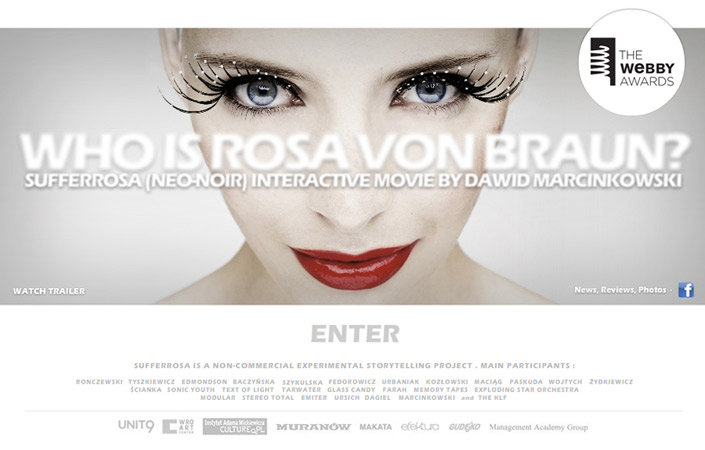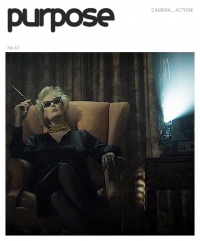
Career in Culture
The Internet gives freedom
For most of the people, probably, film in the Internet is a three-minute clip on YouTube. By saying "film" we think feature, traditional audiovisual production, and the spectator most often is associated with the passive observer of what is happening on the screen. Filmteractive Festival starts on 22 September in Łódź - it's a festival devoted to video art in the Internet and interactive branch. This is why the biggest, noncommercial interactive film "Sufferosa" directed by Dawid Marcinkowski - the winner of many prizes, nominated i.a for Oscars of the Internet - The Webby Awards will be presented.
Creativity of the production is in giving the audience the possibility to control the storyline. The spectator does not only observe the action but also by the clicks decides about the continuation of the film. What's the most important - he becomes not only the main character but also the creator. What happens on the screen depends only on "clicks" of a computer mouse. Fun with "Sufferrosa" is not just about making decisions and possibilities to make changes. The film is full of references to literature, film noir and music. "Sufferrosa" is over 120 scenes, a few alternative endings, Beata Tyszkiewicz, Maciej Kozłowski and Michał Urbaniak acting, but most of all it’s an opportunity to participate in creation and course of events.We invite you to see the film on 23 September at Film School in Łódź.
Why did you begin your artistic work in the Internet?
At the beginning of 2000 Flash esthetics of the Internet was something incredibly fresh and exciting to me. Works of people like Yugo Nakamur still make an impression. My greatest interest was in the influence of the interactivity on telling the story.
How do spectators' needs change in time? Isn't the traditional, linear film form enough to catch spectators' eye?
People raised with the Internet and computer games are stepping into their adult life. In the 80's, because of MTV, it was something normal to edit a video clip, and now interactivity or non-linearity is something obvious.
In the interview for "Gazeta Wyborcza" you said that "generation sitting on couch in front of TV fades away" - does that mean that non-interactive works will land on the scrap heap?
People watching TV all day are retired. Whereas people spending 15 hours a day on the Internet are idiots. It's all about the proportions.
How do you understand the term "active spectator"? How have you stimulated the spectator for the purpose of "Sufferrosa"?
The spectator decides on development of the story. When he or she "clicks" the story evolves, and when they stop "clicking" - it stops. It's easy.
Project "Sufferrosa" has been created for almost 10 years, works began in 2000. Why did it take so long to prepare?
Lack of money. "Sufferrosa" isn't commercial. It's rare to have a non-profit project realized on such a big scale. In case of my film you enter the site (www.sufferrosa.com) and watch it for free. That's why I dedicated this film to band KLF, Billy Drummond and Jimmy Cauty. At the beginning of the 90's they were really successful both artistically and commercially, and what they had earned was burnt in a bone fire - £1 000 000.

SUFFERROSA, Screen, Photo: Kasia Kifert
I'm particularly curious about engaging Beata Tyszkiewicz, for whom such an innovative project - because of the generation barrier - must have been quite a challenge. All of the actors enjoyed the topic, roles I offered to them and the idea of film maze such as "Sufferrosa".
Notice that all of the actors play roles which are far away from what they usually do. A lot of grotesque and jokes. Michał Urbaniak is a Russian general waiting for sex reassignment surgery, Gosia Baczyńska is a boss of a terroristic commando which blows plastic surgeries up.
There is no such thing as generation barrier talking about Beata Tyszkiewicz or other older actors. They're open, distanced and they have sense of humor. They've acted in great films, saw the world. I think that the problem is in part of the young celebrity actors. They're "doped by acting" in all those embarrassing films.
"Digital storytelling" is a term which appears on your website. Why may the Web seem to be better place to tell the stories? Or maybe it limits in some way?
I make a film on my laptop in the kitchen, put it on the Internet, and a few days later I'm invited to Philippines. That's how it works. It's not easy to talk about the limitations. Of course, it generates other problems e.g. overproduction and so on. I recommend film "PressPausePlay" which shows the advantages and disadvantages of creating in times of - ok... I'll use the cliché - "digital revolution".
The first ideas for the script related to "The Fountain" - are you inspired by Darren Aronofsky?
No. In 2004 I wrote one version of "Sufferrosa" screenplay in which Spanish conquistador and seeker of Fountain of Youth Juan Ponce De Leone appeared. When I found out that he's one of Aronofsky's characters I quit this woof.
You're an author of a few webeo forms - "Smolik Attitude" and Maria Peszek's clips. So what's the difference between working on traditional and interactive clip?
In first seconds the spectator can play with the view and history. They are free to do what they want. Each time they can see the clip in different version.
"Sufferrosa" is a highly modern project - where's the idea to join modernity with clear reference to an old tradition of film noir from?
I prefer old films. Hardboiled fiction from the 40's, science-fiction from the 50's, films from the 60's and 70's. Spaghetti westerns lately. You should watch Buñuel's films. It's good. Now, apart from Lars von Trier, cinema is polite.

SUFFERROSA, Screen, Photo: Klaudiusz Dwulit
I prefer old films. Hardboiled fiction from the 40's, science-fiction from the 50's, films from the 60's and 70's. Spaghetti westerns lately. You should watch Buñuel's films. It's good. Now, apart from Lars von Trier, cinema is polite.
Watching the film I couldn't stop myself from thinking that it's similar to heavy, gloomy climates of David Lynch. What are the other characters from film, art, music, literature inspiring you while creating?
Yes. Everything’s gloomy, that's Lynch. In "Sufferrosa" there are maybe two scenes which are a pastiche of Lynch. But that's all. It's too characteristic to relate to it directly. Watch a funny movie by Barczyk "Nieruchomy poruszyciel". It's 300% of Lynch in Lynch. My inspirations are W.J. Has, Jan Potocki and "Rękopis znaleziony w Saragossie", Vernon Sullivan, Italo Calvino, Dieter Bohlen…
What do you think about 3D cinema?
I'm not really interested. I'm interested in 3D documents and new "Alien" directed by Ridley Scott. Virtual reality interests me more. It's going to be a break through.
Your film is about beauty worship. What inspired you to create a film about it? How did you create the idea of "rejuvenilization"?
Beauty worship doesn't come from the XXI century. Though, it has never had such influence on the perception of millions of people. Most women believe in non-existent images, millions are trying to become like them. But it's not just about women. Look at Krzysztof Ibisz.
You were awarded many times. "Sufferrosa" became the international success, it was presented in many countries, and it has recently been nominated for the Internet Oscars - mentioned The Webby Awards. Which achievement (also from those I didn't mention) is the most satisfying for you?
Webby Awards is the most important. It's the first Polish film nominated for Webby.
You said after Peter Greenaway that "cinema as a product of the XX century is dead" - does that mean that traditional, linear form is in the past? What's your vision of film art in a few years from now?
Greenaway likes controversial slogans. I agree that cinema has its good times behind. As I said, I mainly watch cinema of the 40's - 70's and its not snobbery. Even ordinary commercial cinema from that time is cosmic comparing with what is being produced now. It think that sometime soon cinema, computer games and virtual reality will become one thing.

Sufferrosa Hires Klon Photo: Kasia Kifert
I'm interested in telling stories. Kind of medium doesn't matter.
What are your nearest plans? A big new project?
Any day there will be the premiere of an interactive Smolik's video clip - lasers, mutants from the space, superheroes. It's our homage to science-fiction from the 50's.
You've left to create in London. Does the Great Britain give bigger development possibilities, better perspectives for people making interactive forms on film and the Internet line?
There are no perspectives in Poland. Forget it. Sounds weak but let's not cheat. "Sufferrosa" was totally ignored by film environment. No interest at all. Offers came from the UK, Canada, the USA or Spain. You know, there still is this scheme working in Poland: you do something innovative and until you succeed abroad nobody will care about you in Poland. Look, even our interview is taking place one year after premiere. After nominating me for Webby.
Do you think about directing traditional, linear story - film in which not computer screen but cinema screen will be the interface?
Yes
Dawid Marcinkowski, director of Sufferrosa spoke with Daria Głowacka
Check the archive

no 67 January 2013
theme of the issue:
CAMERA... ACTION!
< spis treści
Article
From editors
Presentation
Directed by Jakub Czekaj
Analysis
Film and mimesis - Artur Zaguła
Career in Culture
The Internet gives freedom - interview with Dawid Marcinkowski, director of Sufferrosa - Daria Głowacka
Culture Industries
Idea is the most important - interview with Olgierd Cygan, the initiator of Filmteractive - Daria Domańczyk
On the Margin
X, y, z... - Agnieszka Furmańczyk





